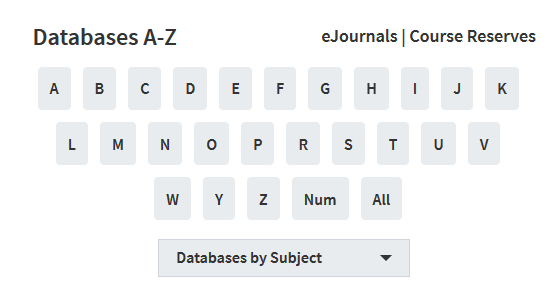Searching for Data
The Data & Visualization Services department can assist you with finding data for your research project. Contact our faculty and staff for help with your data searches.
We can help you:
- Access and download large datasets such as American Community Survey and the General Social Survey.
- Find data housed in data repositories, such as ICPSR.
- House data in data repositories.
- Gain access to and use of data resources across disciplines.
For finding data housed in repositories, the best place to start is re3data.org, a search engine for research data repositories:

In addition, Nature.com has an article that lists scientific data repositories, with discipline-specific data sources as well as omnibus resources for finding data.
The University of Miami’s Richter Library website has a databases section which contains access to several useful data sources.

Some of the databases include Statista, containing “85,000 diverse topics of data and facts from over 10,000 sources,” SNL Kagan, which “provides media and communications business intelligence including data, news, and analysis on US and global markets for radio, television, motion pictures, and emerging technologies,” Web of Science, and Scopus.
Recommended Datasets for General Skills Training:
- BRFSS (Behavioral Risk Factor Surveillance System): “The Behavioral Risk Factor Surveillance System (BRFSS) is the nation’s premier system of health-related telephone surveys that collect state data about U.S. residents regarding their health-related risk behaviors, chronic health conditions, and use of preventive services. Established in 1984 with 15 states, BRFSS now collects data in all 50 states as well as the District of Columbia and three U.S. territories. BRFSS completes more than 400,000 adult interviews each year, making it the largest continuously conducted health survey system in the world.”
- GSS (General Social Survey): “The General Social Survey (GSS) is a nationally representative survey of adults in the United States conducted since 1972. The GSS collects data on contemporary American society in order to monitor and explain trends in opinions, attitudes and behaviors. The GSS has adapted questions from earlier surveys, thereby allowing researchers to conduct comparisons for up to 80 years. The GSS contains a standard core of demographic, behavioral, and attitudinal questions, plus topics of special interest. Among the topics covered are civil liberties, crime and violence, intergroup tolerance, morality, national spending priorities, psychological well-being, social mobility, and stress and traumatic events.”
Data Repositories

figshare is a third-party privately run repository that hosts general research data and can assign Digital Object Identifiers (DOIs) to data.

DataONE is a community driven project which provides access to earth and environmental science data.

Harvard Dataverse is part of the Dataverse project, a network of open-source repositories. It contains over 80,000 datasets.

ClinicalTrials.gov is a database of privately and publicly funded clinical studies conducted around the world.

Sage Data provides a single platform to quickly find, explore, visualize, and share detailed data from the most trusted source providers. It is multidisciplinary and global in its scope.”




